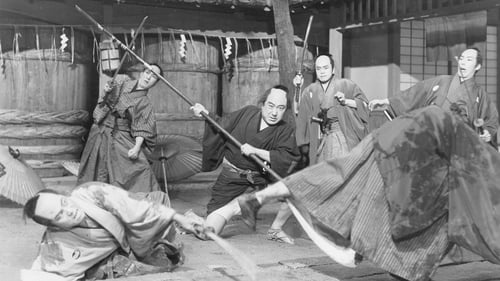
Light-hearted samurai comedy. The second son of a feudal lord runs away from an arranged marriage. He saves the life of a princess whom he gets to fall in love with. It turns out that she is just his prospective bride.

This adaptation of a Hideji Hojo novel, about the historical uprising of the Kuroda clan in 1633, is told through the eyes of retainer, Daizen. As his clan’s new leader, Tadayuki, becomes increasingly militant in his opposition to the Tokugawa shogunate, Daizen is forced to reconcile his loyalty to the clan with his loyalty to Tadayuki, who seems dead set on entangling the clan in destructive conflict. The Kuroda Affair’s mise-en-scène is said to have influenced future Toei director Eiichi Kudo. The film also features two of the greatest stars of Japanese period cinema, Chiezo Kataoka and Ryutaro Otomo.

Молодой самурай, вместе с двумя своими слугами, совершает путешествие в Эдо. Длинная дорога, череда проносящихся образов — бездомный мальчик-сирота, странствующая танцовщица с дочерью, старик, собирающийся продать свою дочь, вор, орудующий на дороге, инспектор, разыскивющий его — хорошо прописанные, достоверные характеры, жизненные ситуации, полные чувства, временами печальные, временами смешные. Венчает все великолепный, полный драматизма и эмоционального накала, жестокий финал.


After the Onin War ended in 1477, Kyoto was left in ashes and the nation was in complete disorder. Bands of roving samurai called the "nobushi" terrorized the country under the leadership of Akagaki Genba and overthrew Mangetsu Castle in Tanba Province scattering the few survivors. Lord Niwa's two sons have been studying in China and return to Japan upon hearing of the tragedy in an attempt to restore the clan. On Mt. Oe they meet magician Kiri no Kojiro and try to enlist his aid. With touches of the supernatural and rousing sword-play can they succeed against the evil villains whose symbol is the skull mask?

The second film in the 1953 trilogy based on the long novel series The Great Bodhisattva Pass.



